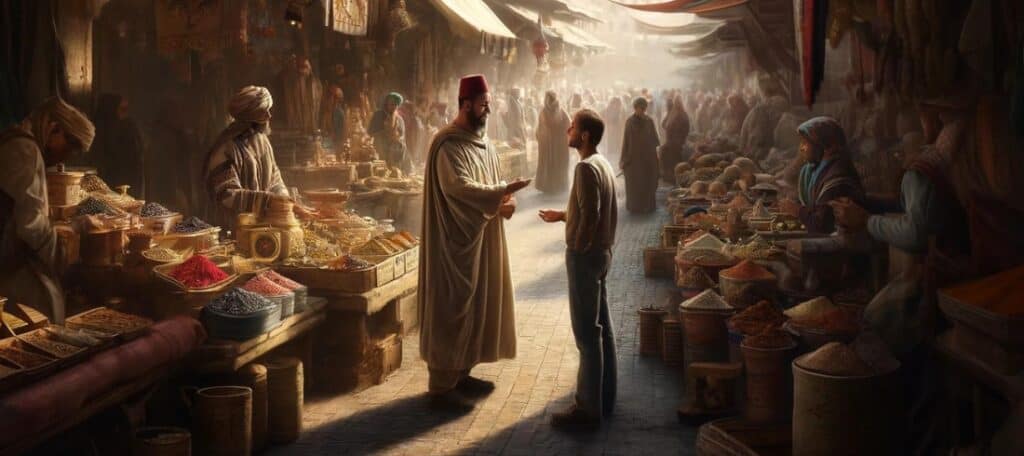
Imagine the vibrant Marrakech souk. It’s an explosion of color and life. Each turn reveals a new tapestry of sounds, sights, and smells. In the crowd, a particular craftsman’s stall captivates a traveler. It shows fine leatherwork unlike anything back home. It’s here in this lively marketplace. The practice of bargaining in Morocco is ancient. It’s a rhythmic dance of words and gestures between buyer and seller. The traveler did their homework. They know that negotiation is critical in these talks. It’s not only for a reasonable price but also the culture. They know Moroccan market customs are not just about trading goods. They are about respect and relationships. It’s a delicate balance of push and pull. Let’s dive into the details of this lively tradition. We’ll unravel the tactics for successful haggling adventures in the heart of Morocco.
Understanding Moroccan Market Dynamics
Engaging with the lively Moroccan markets requires a deep appreciation. You must appreciate the intricate tapestry of local customs and behaviors. The ability to navigate these spaces comes from understanding them. They are the crowded Moroccan market culture. In this culture, every transaction is a dance of wit and persuasion. Haggling customs play a key role in this ecosystem. They make each purchase not just a trade of goods but also a cultural exchange.
The Cultural Significance of Haggling
In Morocco, haggling is not just a way to an end. It’s a key part of social life. The lively banter, smiles, and jests are key. The back-and-forth is too. They are all cornerstones of the Moroccan market. To newcomers, this might just seem like a way to negotiate a better price. But, for Moroccans, it’s a deeper, almost ritualistic engagement. It reinforces community and tradition.
The Psychology of the Seller: Strategies Revealed
Understanding sellers’ psychology in Moroccan markets is key. It is key for any successful negotiation. Sellers are adept at reading body language and gauging interest. They use strategies that hinge on creating an emotional connection with the buyer. By weaving stories about their wares, they enhance the appeal of their offerings. Moreover, they often discuss the hard work involved in their trade, raising the overall quality.. This is to foster empathy as part of their psychological tactics.
The Perception of Foreign Buyers
Perception is key in Morocco’s busy bazaars. This is especially true for foreign buyers, who often stand out. Sellers’ psychology changes as they identify a buyer’s origin. This reshapes haggling and prices. Sellers factor in how foreign buyers perceive things. They may assume that foreigners have bigger budgets and value items differently. So, for visitors, knowing these dynamics can level the field. It turns dangers into savvy negotiation strategies.
Negotiating in Morocco: Identifying Your Vulnerabilities
Negotiating in Morocco’s vibrant markets is an intricate dance. It means understanding the seller’s tactics and recognizing your own vulnerabilities. To parry a vendor’s thrust, you must first address the emotions of haggling. They could weaken your position. The souks are bustling. The rhythm of commerce there beats as fiercely as the midday sun. It’s crucial to stay cool.
Overcoming Guilt and Recognizing Seller Tactics
One significant emotional hurdle is guilt in bargaining. It can happen when you face a pushy seller. Their livelihood seems to depend on your purchase. But, knowing that bargaining is part of Moroccan market culture can ease this undue guilt. It’s important to stand firm and remember this: negotiations are expected. It’s a game both you and the seller play. Moreover, recognizing seller tactics is your first line of defense. Vendors recognize uncertainty. So, they might use psychological strategies to get a higher price from you. Your ability to detect these tactics is key. You need to stand your ground and negotiate from a position of informed confidence. This will make all the difference.
Good Cop-Bad Cop: A Common Ploy in Moroccan Markets
The good cop bad cop strategy is a classic seller’s ploy. You may encounter it during your market adventures. Sellers may work in teams. One plays the ‘reluctant’ partner to the other’s agreeable demeanor. The seesaw is meant to unsettle you. It aims to nudge you to a higher price through emotional tricks. Recognize this act for what it is: a strategy, not real disagreement. Then, you can focus on negotiating the best deal for yourself. You won’t be swayed by theatrics.
Financial Pretense and Its Effects on Bargaining
In Morocco’s busy marketplaces, negotiation is not just about words. It’s also about unspoken cues, like the ones from appearance and wealth. So, pretending to be good with money can greatly affect how a negotiation goes. A buyer’s clothing or accessory display may lead to assumed affluence. This can impact price talks before they start.
The Importance of Discretion in Showcasing Wealth
Discretion in bargaining is valuable. It tempers the seller’s expectations about a buyer’s ability to pay. When talking to sellers, be modest. This can avoid showing wealth that can raise prices. Good negotiators know that displaying wealth may weaken their position. It shows that they can agree to a higher price. So, there is a strategy to the clothes and accessories you choose. You wear them when going into the busy souks.
Dual-wallet Strategy: Managing Perceived Purchasing Power
Managing spending power is happening. It is at the same time as the rise of the dual-wallet strategy. It has emerged as a clever way to navigate financial impressions. This approach involves carrying two wallets. One has limited cash for negotiations. The other is a hidden reserve to ensure readiness for an acceptable deal. This method helps stick to a budget. It also bolsters resolve in negotiation by showing the limits of spending power. The dual-wallet strategy cleverly manages the perception of buying power. It does so without revealing the full extent of one’s wealth.
Strategic Emotional Detachment for Better Deals
In the twisty bazaars of Morocco, emotion can be both an enemy and a friend in the delicate dance of negotiation. Bargaining is an art. It demands a keen sense of value and adeptness in emotional detachment. To navigate the bustling souks, you must emerge with gratifying transactions. To do this, one must learn the subtle art of controlling emotions in bargaining. Buyers can use this emotional mastery to get the leverage they need. They can use it to negotiate prices that reflect the true worth of their desired items.
Controlling Your Emotions to Conceal Interest
Controlling how enthusiastic you seem can give a negotiator an advantage. In the charged Morrocan markets, a stoic demeanor is not just armor. It is also a strategy. The principle of keeping your composure aims to remove any advantage. The seller might get from your eagerness. Buyers can control emotions in bargaining. This prevents high counteroffers and keeps the negotiation moving. It also guides the discussion to a better price.
The Risks and Rewards of Feigning Disinterest in Desired Items
Many think being excited helps in haggling. But, pretending not to care is powerful too. This ploy, however, comes with its own spectrum of risks and rewards. On one hand, not being attached to desired items might lure sellers into better pricing. They fear losing the sale. But if you act too uninterested, they may dismiss your proposal. Or worse, you may leave empty-handed. The balance between disinterest and desire must be finely tuned. It must be tuned to each encounter, each vendor, and each unique exchange.
Utilizing Time as a Tactic in Negotiation
Understanding time as a negotiation tactic is crucial. This is important when navigating the complexities of the Moroccan marketplace. Mastering this part of negotiation can be the make-or-break difference. It can be what clinches a deal. A common misconception is that one needs to rush through bargaining. But, using time well means knowing when to speed up and when to slow down talks.
In the realm of timing in bargaining, patience often equates to power. Being willing to walk away or taking a moment to think can show sellers that you are not rushed to finish the deal. Alternatively, when time is crucial for the vendor. This knowledge can be used to your advantage. But, be careful not to exploit the situation unethically.
Negotiations’ timing can be strategic. It can include considering the time of day. In the early morning or just before the market closes, commerce is less intense. Then sellers may be more willing to offer better deals. Recognize these sweet spots in time. Adjust your approach to use time well. This can be very helpful.
By astutely observing the local economy’s rhythm, one can create a timing strategy. It will align with cultural norms and market dynamics. Remember, in bargaining, timing can be everything.
On a psychological level, time can create a perceived value around an item. A seller can justify a higher price by explaining the history and craftsmanship of a product. A buyer’s interest shown by examining goods can be leveraged by the seller. Successful negotiators navigate these time-related cues with careful attention to timing in bargaining.
To use time as a negotiation tactic, also consider your limits. Communicate time constraints when needed. This can set the stage for a more focused bargaining session. Each party is aware of the ticking clock and more likely to reach a quick agreement.
Price Negotiation Techniques: Finding the Sweet Spot
In Morocco’s busy markets, mastering price negotiation is like performing a well-rehearsed dance. The magic lies in conversation’s rhythm. It’s the ebb and flow of offers and counter-offers. You and the seller use it to find the right price. One key strategy is to start your bid at a third or even half of the asking price. Then, raise your offer slowly as negotiations progress. This approach creates a framework for both parties. They can work towards a compromise without feeling undervalued or taken advantage of.
Finding the sweet spot involves reading context clues and non-verbal signals. These are key parts of Moroccan bargaining. A potent tool in your negotiation strategies is showing a polite but firm demeanor. It balances respect for the merchant’s business. It respects your determination to strike a fair deal. Moreover, employing the power of silence can sometimes be as effective as any word spoken. A pause, used strategically after a counter-offer, might prompt the seller to reconsider. They might lower their price or offer more to seal the deal.
Negotiation is an art in Morocco. It’s a cultural experience, far from the stark, fixed prices. By embracing these practices, you show a real appreciation for the craft and origin of the items. This creates a bond beyond the dirhams changing hands. Earning the merchant’s respect through your bargaining skill. It often leads to a fair outcome. Both parties then leave happy. This is the key to success in negotiation. You must find the place where both sides respect each other and see fair value.
FAQ
What is the cultural significance of haggling in Morocco?
Moroccan society deeply values haggling. It is seen as a normal part of buying and selling. It is a way to show respect for the seller’s skills and create a sense of camaraderie.
What strategies do Moroccan sellers use to maximize their profits?
Moroccan sellers often use tactics. They start with high prices, offer bulk discounts, and use persuasion to get buyers to spend more.
What challenges do foreign buyers face in the Moroccan market?
Foreign buyers may face language barriers and cultural differences in bargaining. They may also be seen as wealthy tourists. They must know about these challenges. And, they must change their negotiation strategies.
How can I overcome guilt in bargaining and recognize seller tactics?
To overcome guilt in bargaining, you must understand the culture. You must recognize that negotiation is expected. To recognize seller tactics, watch for high initial prices. Also, watch for time pressure and emotional manipulation.
What is the good cop-bad cop strategy in Moroccan markets?
The good cop-bad cop strategy is common in Moroccan markets. One seller acts tough while the other seems sympathetic and willing to compromise. It is important to be aware of this tactic and not let it affect your negotiation stance.
How can I manage the perception of my wealth during bargaining?
It is important to showcase wealth discreetly to avoid inflated prices. Use the dual-wallet strategy. Have a visible wallet with a limited amount of money and a hidden wallet with more funds. This allows you to manage perceived purchasing power effectively.
How can emotional detachment help in securing better deals?
Emotional detachment involves controlling your emotions. You do this to seem less interested in a desired item. This can lead to better bargaining outcomes. Sellers may be more willing to offer lower prices.
How can I leverage time as a negotiation tactic in Morocco?
Timing is important in negotiation. Use time limits to your advantage. Create urgency or wait for the right moment to negotiate. That’s when the seller may be more willing to compromise.
What price negotiation techniques can help me find a mutually beneficial price agreement?
Many price negotiation techniques can work. For example, start with a lower counteroffer. Also, offer to buy multiple items for a discount. Lastly, show a willingness to walk away if a good price can’t be reached.








